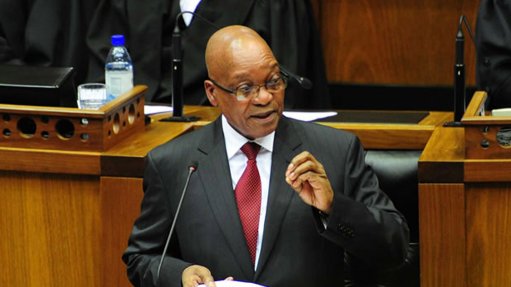
Jacob Zuma
The biggest political challenge currently facing South Africa is getting local government to work efficiently, political analyst Theo Venter told Engineering News Online at a BMI Building Research Strategy Consulting Unit strategic forum on Friday.
“Local government is the closest form of government to South African citizens and it is where all important services, such as water, electricity and housing, are rendered,” he said.
Venter stressed that local government was in extreme debt and that, out of 278 local entities, only 30 were financially viable.
“It is a huge crisis and I think it is a big red political flag for 2016,” he said, adding that local government needed to be better managed.
“When a country is confronted with a developmental crisis that includes low growth, unemployment and poverty, the only thing it can do is manage the resources that it has efficiently, and that is not currently the case,” he stated.
Venter predicted that, with local government elections scheduled to take place in August, the African National Congress (ANC) would have a hard time maintaining 60% of the votes in the upcoming elections.
“I think [the ANC’s] support in the coming election will be closer to between 54% and 58%. I think the [Democratic Alliance] will get 27% of the votes; they won’t reach the 30% that they are aiming for.”
He predicted that the big winner in this year’s municipal elections was going to be the Economic Freedom Fighters (EFF), which would most likely increase its support by 100%, from obtaining 6% of the votes in the last election to 12% in the upcoming elections.
“The EFF initiated the case against [President Jacob] Zuma at the Constitutional Court and has made it very difficult for the President to do his work in Parliament.”
Venter did not feel that Zuma would stay in his current position until 2019, as the burden that he had placed on the ANC was becoming too heavy.
“They have already taken his picture off ANC promotional T-shirts. However, I do not see a quick exit for Zuma at all,” he said.
Meanwhile, Venter noted that Thursday’s Constitutional Court ruling ordering Zuma to repay State money spent on his private homestead demonstrated that South Africa’s institutional structures were intact and that the country still had an independent judicial system.
Venter told Engineering News Online that the Constitutional Court’s ability to declare actions by Zuma unconstitutional was sure to promote a positive credit ratings climate.
He also noted that professional services firm KPMG’s termination of its business relationship with the Gupta’s growing business empire, owing to the political storm surrounding the family's friendship with Zuma, meant that international corporations were sensitive to the political image that surrounded companies.
KPMG had been the auditor for all Gupta-owned and -controlled businesses and performed a variety of other services for the Guptas, who were allegedly at the heart of the alleged "State capture" plan.
“I think it is an important message for companies like [State-owned power utility] Eskom, as well as various mining groups. KPMG is saying that it cannot be associated with a group of companies that, in the public domain, are regarded as the enemy of the country or are in some way untouchable,” he said.